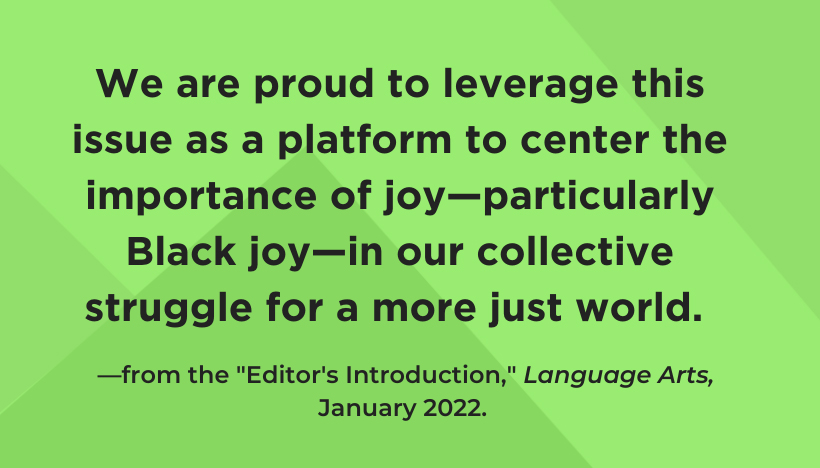This post comes courtesy of the “Editor’s Introduction,” written by the editors of the January 2022 issue of Language Arts.
Joy is crucial for social change; joy is crucial for teaching. Finding joy in the midst of pain and trauma is the fight to be fully human. A revolutionary spirit that embraces joy, self-care, and love is moving towards wholeness. Acknowledging joy is to make yourself aware of your humanity, creativity, self-determination, power, and ability to love abundantly. Freedom dreams are brought to life through joy and love of dark people’s light. Joy makes the quest for justice sustainable. (Love, 2019, pgs. 119–20)
We are proud to leverage this issue as a platform to center the importance of joy—particularly Black joy—in our collective struggle for a more just world. In their powerful calls for and models of antiracist English language arts pedagogies, scholars like Bettina Love (2019) and Gholnecsar Muhammad (2019) both emphasize joy as a critical (and often missing) component of learning. With her historically responsive literacy model (2019), Muhammad challenges us as educators to ask ourselves questions about children’s brilliance and joy, such as “How does our curriculum and instruction respond to or build upon students’ knowledge and mental powers?” and “How does our curriculum and instruction elevate beauty, truth, and happiness in humanity?” (Muhammad & Mosley, 2021, p. 194). Inspired by this thinking, and with an interest in how elementary and early childhood educators are doing the work of centering joy in school and ELA pedagogies, we solicited manuscripts for this themed issue exploring the joyful and brilliant engagements of children and youth as they read, write, speak, and explore their worlds in critically engaged ways.
We are pleased to share two feature articles and one Perspectives on Practice piece. In “‘History Is a Way of Building Identity’: How One Elementary Independent Neighborhood School Uses Black Cultural Movements to Engage Children’s Sociopolitical Perspectives,” Wintre Foxworth Johnson illustrates how one elementary school centers Black history as a liberatory literacy pedagogy and practice. Mary Beth Snow Balderas, Molly Hamm- Rodríguez, Vanessa Santiago Schwarz, and Mileidis Gort, in their piece “Resisting High Stakes Educational Reform through Genre Writing in a Multilingual Classroom,” examine how one second grade teacher engaged the brilliance of multilingual student writers and resisted the educational survival tactics (Love, 2019) shaping literacy instruction at her school by using systemic functional linguistics genre pedagogy. Finally, in “Planning for Book Joy: Reconceptualizing Power in Literacy Instruction,” Katie Egan Cunningham and Grace Enriquez “encourage fellow educators to rethink our practices to empower children to take action in their lives, individually and collectively, and to know their brilliance and worthiness, particularly in their relationships with books.”
And you won’t want to miss the columns in this issue!
In the Research and Policy column edited by Brian Kissel, Gholnecsar Muhammad has written a piece entitled “Cultivating Genius and Joy in Education through Historically Responsive Literacy,” where she explores “joy as it relates to the lineage of Black people with the purpose of using Black historic teachings as a guide toward advancing the state of education for all youth today.”
Elizabeth Dutro and Erica Caasi have written a piece called “Seeking Poetics and Seeing Brilliance in Children’s Writing Across Genres” for the Responsive Teaching column, where they discuss “seeing and seeking the poetics of students’ writing as an intentional practice.”
Miriam Ortiz, Tracey Flores, and Emily Machado, in the Writing Matters column, seek to “make visible the brilliant teaching of educators working alongside multilingual learners and the intentional steps they take to design curriculum and create classroom spaces that cultivates the genius (Muhammad, 2020) of each individual learner.” Their piece is entitled “Our Stories at the Center of the Curriculum.”
Finally, Aeriale Johnson features “text sets and series that help children experience and sustain the deep joy of reading,” in her Children’s Literature column, entitled, “‘Endless Fun’: How an Instructional Framework, Series, and Text Sets Nurture Joyful Readers.”
We are very grateful to illustrator Jennie Poh and Magination Press for permission to use the cover image from Lulu the One and Only by Dr. Lynnette Mawhinney for this issue.
You can learn more about Jennie Poh’s work here: https://the brightagency.com/uk/publishing/artists/jennie-poh, and about Lulu the One and Only here: https:// www.apa.org/pubs/magination/lulu-one-only.
And last, but certainly not least, Kim Morse, Jim Sitar, Ernesto Yermoli, Misha Khan, Nevien Shaabneh, Amanda Diaz, Megan Kybartas, and Tevin Byers, you have our deepest gratitude for your support producing this issue.
References
Love, B. L. (2019). We want to do more than survive: Abolitionist teaching and the pursuit of educational freedom. Beacon Press.
Muhammad, G. (2019). Cultivating genius: An equity framework for culturally and historically responsive literacy. Scholastic
 Rick Coppola is an award-winning, middle-school ELA teacher in the Chicago Public Schools, where he has worked for the last 16 years. He is also a doctoral candidate in language, literacy, and learning at the University of Illinois at Chicago.
Rick Coppola is an award-winning, middle-school ELA teacher in the Chicago Public Schools, where he has worked for the last 16 years. He is also a doctoral candidate in language, literacy, and learning at the University of Illinois at Chicago.
 Kara Taylor is a clinical assistant professor in the Urban Teacher Education Department at Indiana University in Bloomington. She is a former elementary teacher, literacy coach, and curriculum designer, and has a research interest in culturally sustaining writing instruction/assessment enacted by teachers of color for students of color.
Kara Taylor is a clinical assistant professor in the Urban Teacher Education Department at Indiana University in Bloomington. She is a former elementary teacher, literacy coach, and curriculum designer, and has a research interest in culturally sustaining writing instruction/assessment enacted by teachers of color for students of color.
 Sandra L. Osorio is an associate professor in the School of Teaching and Learning in Early Childhood and Bilingual/Bi-cultural Education. She is the author of the recently published book Book Talk: Growing Into Early Literacy Through Read-Aloud Conversations from Teachers College Press.
Sandra L. Osorio is an associate professor in the School of Teaching and Learning in Early Childhood and Bilingual/Bi-cultural Education. She is the author of the recently published book Book Talk: Growing Into Early Literacy Through Read-Aloud Conversations from Teachers College Press.
 Rebecca Woodard is an associate professor of curriculum and instruction at the University of Illinois at Chicago. Her research focuses on critical and culturally sustaining writing pedagogies, ELA pedagogies that support climate justice, and arts-informed pedagogies with an emphasis on embodiment and making.
Rebecca Woodard is an associate professor of curriculum and instruction at the University of Illinois at Chicago. Her research focuses on critical and culturally sustaining writing pedagogies, ELA pedagogies that support climate justice, and arts-informed pedagogies with an emphasis on embodiment and making.
It is the policy of NCTE in all publications, including the Literacy & NCTE blog, to provide a forum for the open discussion of ideas concerning the content and the teaching of English and the language arts. Publicity accorded to any particular point of view does not imply endorsement by the Executive Committee, the Board of Directors, the staff, or the membership at large, except in announcements of policy, where such endorsement is clearly specified.

